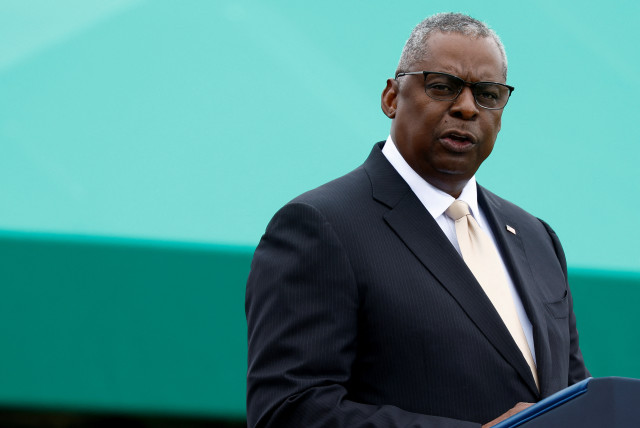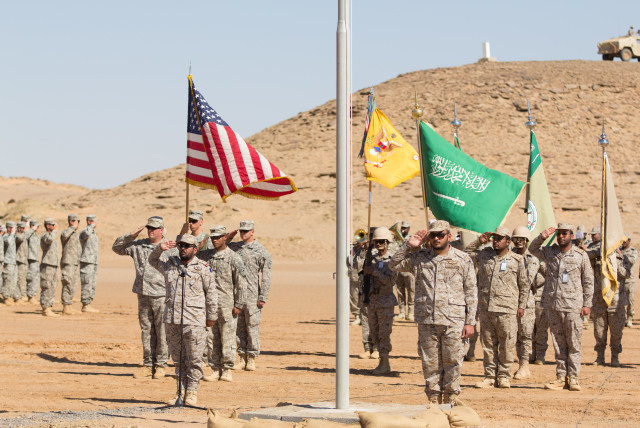US moves carrier strike group closer to Israel amid fear of multi-front war

"It wouldn't be a surprise" if the attack was in part meant to sabotage a Saudi deal, said Antony Blinken, US Secretary of State.
The United States will move a carrier strike group closer to Israel, which includes the Ford carrier and ships that support it, US Defense Secretary Lloyd Austin said on Sunday amid fears of a multi-front war.
The Pentagon will also be adding fighter jets in the East Mediterranean region. Austin said the US will provide munitions to Israel and that its security assistance will begin moving on Sunday.
This “underscores the United States’ ironclad support for Israel,” Austin wrote in a statement he posted on X (formerly Twitter).
The US is also expected to increase its fiscal military assistance to the Jewish state amid a flurry of Israeli diplomatic activity to secure global support for an IDF ground campaign in Gaza against Hamas.
“Additional assistance to Israel for the IDF is now on its way to Israel with more to follow in the coming days,” US President Joe Biden told Prime Minister Benjamin Netanyahu when the two spoke on Sunday, for the second time in two days, according to the White House.
They spoke on the second day of a Hamas assault against Israel’s southern border communities in which over 700 soldiers and civilians were killed and scores were kidnapped.
On Monday night, soldiers continued their ground battles with Hamas terrorists for the second day and Hezbollah launched rockets at the northern border.
“The [two] leaders also discussed ongoing efforts to ensure that no enemies of Israel believe they can or should seek advantage from the current situation,” the White House said.
Biden also spoke with Jordan’s King Abdullah as US Secretary of State Antony Blinken embarked on a wide-ranging series of calls to seek an umbrella of support to calm the situation.
In his conversations, Blinken sought Hamas condemnation and underscored US support for Israel’s right to defend itself.
Among the calls he made were to Palestinian Authority President Mahmoud Abbas and his counterparts in Jordan, Egypt, Saudi Arabia, Qatar, Turkey, Italy, and the European Union.
Blinken says action may have been in part to sabotage Saudi deal
In an interview with CNN, Blinken said, “our first focus is to make sure that Israel has what it needs to deal with the situation in Gaza, to deal with the some-thousand militants who came into Israel – again, attacking Israeli civilians in their homes, in their towns.”
He said it was possible Hamas chose to act now due to US efforts to secure a security pact with Saudi Arabia that would include a normalization deal with Israel.
“It wouldn’t be a surprise that part of the motivation may have been to disrupt efforts to bring Saudi Arabia and Israel together, along with other countries that may be interested in normalizing relations with Israel,” Blinken said.
Iran has been particularly concerned because the Washington-Riyadh security arrangement is designed to protect Saudi Arabia against an attack from Tehran.
“There’s a long relationship between Iran and Hamas. In fact, Hamas wouldn’t be around in the way that it is, without the support that it’s received from Iran over the years. In this specific instance, we have not yet seen evidence that Iran directed or was behind this particular attack, but there’s certainly a long relationship,” Blinken said.
'A long and difficult war'
Israel’s security cabinet early in the morning approved Netanyahu’s announcement on Saturday that the country was now at war and agreed to take significant military steps.
The goal of such an operation, the cabinet said, is to “achieve the destruction of the military and governing capabilities of Hamas and Islamic Jihad, in a way that will preclude their ability and willingness to threaten and attack the citizens of Israel for many years.”
It also halted the flow from Israel to Gaza of electricity, fuel, and goods.
Israel, Netanyahu said, “is embarking on a long and difficult war.”
Netanyahu on Sunday spoke with German Chancellor Olaf Scholz, Ukrainian President Volodymyr Zelensky, Italian Prime Minister Giorgia Meloni, and British Prime Minister Rishi Sunak. He also appointed Brig.-Gen. Gal Hirsch as coordinator for hostages and the missing.
Egypt and Turkey, both of whom have acted as mediators in the past, worked behind the scenes to calm the situation and to help address the hostage situation.
Turkish President Recep Tayyip Erdogan said his country was determined to ramp up diplomatic efforts.
Erdogan warned against “adding fuel to the fire.”
“We are determined to continue the diplomatic efforts we have started to re-establish calm by intensifying them. We call on all parties with a say in the region to sincerely contribute to peace,” he said.
The fighting comes as Ankara was working to repair ties with Israel after years of acrimony over the status of Jerusalem and the Israeli-Palestinian conflict.
Other nations react
Since fighting began on Saturday, Turkish Foreign Minister Hakan Fidan has held calls with his US, Palestinian, Spanish, Qatari, Saudi, Iranian, Egyptian, and Jordanian counterparts to discuss the matter.
The German government said on Sunday that it was reviewing its hundreds of millions of euros of aid for Palestinians, following the biggest attack on Israel in years by Hamas.
Development Minister Svenja Schulze said the government had always been careful to check that the money was only used for peaceful ends.
“But these attacks on Israel mark a terrible fracture,” she said. “We will now review our entire engagement for the Palestinian territories.”
Germany would discuss with Israel how development projects in the region could best be served, and coordinate with international partners, said the minister for Scholz’s Center-Left government.
Some German lawmakers, from the opposition Conservatives in particular, called for an end to the aid.
“All of Europe, all 27 states, must now say: We need a new start and we will no longer finance terrorists,” said Armin Laschet, chancellor candidate for the conservatives at the last federal election, calling for an end to EU cooperation with Palestinian President Mahmoud Abbas, who is based in the West Bank.
Gregor Gysi, a prominent member of the opposition Left party argued against such a move, saying Hamas, and not all Palestinians, were responsible for the attack.
Eighty countries issued solidarity messages for Israel after Hamas attacked its southern border communities killing at least 600 civilians and soldiers, according to the Foreign Ministry.
“Many of them state Israel’s right to self-defense. This is a message that helps build the space of international legitimacy for the activities of the Israeli government and the IDF,” the Foreign Ministry said.
Among those who have spoken out are Middle Eastern countries such as the United Arab Emirates, Morocco and Bahrain which Israel has relations with, as well as Oman and Saudi Arabia which do not have ties with the Jewish state.
In addition, it noted that Foreign Minister Eli Cohen has spoken with his counterparts in Australia, Canada, Poland, Austria, Italy, Albania, Bulgaria, Benin, Norway, Spain, Finland, the Czech Republic, Germany, France and Great Britain and the United States.
Reuters contributed to this report.
Jerusalem Post Store
`; document.getElementById("linkPremium").innerHTML = cont; var divWithLink = document.getElementById("premium-link"); if (divWithLink !== null && divWithLink !== 'undefined') { divWithLink.style.border = "solid 1px #cb0f3e"; divWithLink.style.textAlign = "center"; divWithLink.style.marginBottom = "15px"; divWithLink.style.marginTop = "15px"; divWithLink.style.width = "100%"; divWithLink.style.backgroundColor = "#122952"; divWithLink.style.color = "#ffffff"; divWithLink.style.lineHeight = "1.5"; } } (function (v, i) { });


